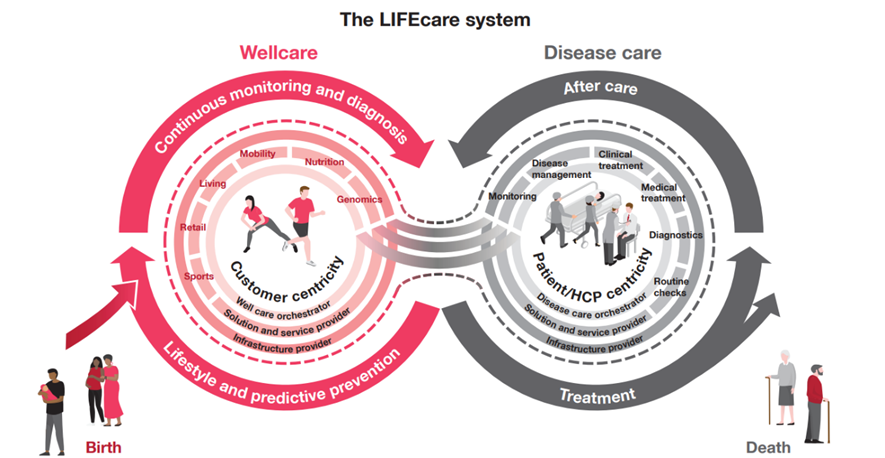The Health Strategist
Knowledge Platform
By Joaquim Cardoso MSc
Chief Research and Strategy Officer (CRSO),}
Chief Editor and Senior Advisor
August, 2023
This is an excerpt and adaptation of the report “Future of Health — How to transform BioPharma for the upcoming LIFEcare system”, authored by Dr. Thomas Solbach ; Dr. Christian Wieber; Patrick Grünewald and Sebastian Schwärzler , and published by “strategy &, Part of the PwC network”, on 2021.
The title above was given by this Editor.
WHAT IS THE CENTRAL MESSAGE?
The healthcare industry is undergoing a paradigm shift from focusing primarily on disease care to a more integrated approach called the LIFEcare system.
This transformation involves a convergence of wellcare (prevention and general wellbeing) and disease care (treatment) systems, leading to personalized, digitized, and preventative healthcare solutions integrated into daily life.
This wide transformation is expected to be widespread by 2035.
The authors believe that this shift will create new opportunities in areas such as preventative care and personalized nutrition, leading to substantial growth in the global wellcare market. On the other hand, spending on disease care, including medicines, is projected to grow at a slower rate.
To achieve the vision of the LIFEcare system, stakeholders in healthcare will need a deeper understanding of individual human biology and lifestyle. This will enable the delivery of wellcare and disease care in a more personalized and early manner.
There is also a need of longitudinal, meaningful data encompassing lifestyle factors, multi-omics, and disease progression to realize this vision fully.
There is a need for a transformative shift in healthcare toward a holistic, integrated, and personalized approach that addresses both wellcare and disease care to improve overall health outcomes.

INTRODUCTION
In the past years, healthcare systems and the pharmaceutical industry have undergone tremendous changes given technological, regulatory and socioeconomic disruptions. [1]
Covid-19 has further intensified and catalysed these changes in healthcare systems and healthcare delivery.
Among others, regulators paved the way for more dynamic and faster decision-making, approved novel technologies including digital health solutions and created new reimbursement pathways.
In parallel, medical and biological research has made breakthroughs with emerging technologies including in-silico protein folding prediction, novel cell therapies and other treatment platforms.
With those trends materializing, borders between industries continue to blur.
This convergence of healthcare, technology and retail & consumer industries will lead to what we call the LIFEcare system.
The critical question for each player in that new normal will be: Are you prepared and what is your right to be successful in this changing future?
PwC´s 2021 global Future of Health study, based on interviews with and survey responses from 150 senior healthcare executives[2], confirms the belief that this acceleration has only just begun.
Over the next decade, the transformation of healthcare will in turn shape the road to success for BioPharma companies in an unprecedented way.

PARADIGM SHIFT
Based on the survey findings and our engagement with clients and partners, we expect the emergence of what we call the LIFEcare system, characterized by a convergence of wellcare and disease care systems.
Overall, more than 75 percent of healthcare executives agree that LIFEcare systems will be widespread by 2035, especially in cardiovascular and metabolic diseases, oncology and neurology.
The authors forecast that the creation of new opportunities in areas such as preventative care and personalized nutrition will lead to a two to threefold increase in the global wellcare market (CAGR of 10 to 12 percent), …
… creating a total value pool of 2.8 to 3.5 trillion USD by 2030.
By contrast, disease care value pools, including spending on medicines, are expected to only grow by a CAGR of 3 percent during the same time period.

OVERVIEW OF THE LIFECARE SYSTEM
Almost unanimously, the 150 healthcare executives in our survey believe that …
… by 2035 healthcare will be centered around human needs, and will be personalized, digitized and preventative, with healthcare solutions being seamlessly integrated into daily life.
To seize the opportunities created by these changes, healthcare …
… stakeholders will need a much deeper understanding of individual human biology and lifestyle, …
… to be able to deliver wellcare and disease care earlier and in a more personalized manner.
However, acting on the outlined trends will require access to longitudinal, meaningful data ranging from lifestyle areas such as fitness, nutrition, and the social determinants of health, to healthcare fields such as multi-omics and disease progression.
Realizing this vision of the LIFEcare system requires the convergence between current disease care systems, focused on treatment, and wellcare systems, focused on prevention and general wellbeing (see Exhibit 1, next page).
EXHIBIT 1 The future LIFEcare system

Source: 2021 survey among 150 healthcare executives; Strategy& analysis
The wellcare system aims to preserve “good health” and provide wellbeing through additions to an individual’s daily routine, ranging from nutrition and supplements to exercise, social engagement and personal use of digital health solutions.
Where wellcare was once seen as marginal, it will be at the core of effective healthcare systems.
For example, the 2019 PwC Health Research Institute report[3]1 outlines a range of social determinants of health which — alongside biological determinants — constitute a person’s health and wellbeing.
Moreover, a 2020 Lancet study[4]2 estimates that around 25 to 50 percent of US disease burden is linked to preventable risk factors — leading to 730 billion USD being spent on treating preventable diseases in the USA alone.
Future wellcare regimes will increasingly pursue partnership models with corporate health programs and reach partial reimbursement agreements with insurers.
This, however, also raises the bar for wellcare providers to generate relevant medical evidence for the positive health impact of their offerings.
The broad spectrum of market openings will attract a correspondingly wide and growing range of wellcare players beyond established healthcare and BioPharma companies. They include food and beverage manufacturers, consumer technology companies, and sports apparel and equipment retailers.
Peloton, an online sports platform which partners with corporates and insurers on funding and reimbursement models, is one example.[5]3
For all non-preventable and non-prevented cases, disease care systems — similar to current healthcare systems — will focus even more on early detection and more targeted and personalized treatment of adverse health conditions.
While the goal of returning the patient to a better state of health and improving his or her quality of life remains constant, three key differences emerge:
1.Disease care will take a more holistic approach to healthcare — leveraging a broader range of health solutions (including advanced therapies, digital solutions and personalized drugs/drug combinations)
2. Patients will play a much more active role in defining the treatment pathway most suitable for their personal situation. Supported by digital health assistants they will be enabled not only to boost their wellbeing during treatment but also to drive treatment success through more active engagement and data-driven, real-time surveillance by healthcare professionals
3. Decision-making in disease care will not only be based on healthcare data but increasingly incorporate multi-omics and lifestyle data
References:
[1] “Future of Health — How to transform BioPharma for the upcoming LIFEcare system”, authored by Dr. Thomas Solbach ; Dr. Christian Wieber; Patrick Grünewald and Sebastian Schwärzler, , and published by “strategy &, Part of the PwC network”, on 2021.
[2] Survey respondents included BioPharma 78%, Diagnostics/MedTech 11%, Digital Health 6%, Broader Health Context 4%, other 1%
[3] https://www.pwc.com/gx/en/news-room/press-releases/2019/social-determinants-ofhealth.html
[4] https://www.thelancet.com/journals/lanpub/article/PIIS2468-2667(20)30204-8/fulltext
[5] https://www.fiercehealthcare.com/payer/unitedhealthcare-to-offer-fully-insuredmembers-free-year-long-peloton-subscriptions












